Periods are many things: messy, emotional, annoying, normal. And yet periods are at the center of a controversy revolving around Pixar's animated film "Turning Red," which depicts 13-year-old Meilin Lee who transforms into a huge red panda when experiencing heightened teenage emotions — a not terribly subtle metaphor for the bodily discomfort preteens experience during puberty.
And for some reason, people had a problem with it. Parents took to Twitter to complain that the movie's content was too mature for children to view. One critic argued that parents would have to answer one too many questions after their children viewed the film. And The Federalist griped that "if you aren't a progressive-leaning teenage girl or suffering from 2000s zombie nostalgia, then this film isn't likely for you." It seems odd to be vexed about a phenomenon as universal as adolescent puberty.
Of course, it's not just puberty that they're objecting to, but menstruation specifically. After all, the "Teen Wolf" franchise and similar projects have often explored the physical coming of age through fantasy storytelling. What's significant is that the "Turning Red" debate speaks to the general underrepresentation of menstruation in Hollywood. Rayka Zehtabchi, the director behind the 2019 Oscar-winning Netflix documentary short "Period. End of Sentence." found that the best way to spark dialogue around menstruation is through storytelling.
RELATED: How the red panda became the face of cute rebellion, from "Turning Red" to "Aggretsuko"
But what is the quality of that storytelling? As the furor over "Turning Red" reveals, periods – especially the first ones that a pubescent child experiences – are not widely embraced as acceptable on our screens. Or, when they do show up, they're depicted with an air of secrecy, shame or straight-up horror. What kind of messaging is that?
Despite the naysayers, the depictions of periods have improved greatly over the years, but that hasn't always been the case. Salon reflects on the effectiveness of portrayals throughout film and TV history of characters who get their first period (aka menarche) on screen — the good, the bad and the very ugly.
"Carrie" (1976)
The scene: In the chilling 1976 adaptation of Stephen King's novel, timid teen Carrie (Sissy Spacek) begins unleashing supernatural powers in response to abuses she suffers by her mother and classmates. Her first period marks the beginning of her unraveling. As bright red blood streaking her hands and legs, Carrie shrieks and huddles naked in a dirty gym locker room as jeering female classmates hurl tampons at her, screaming, "Plug it up!" Even her teacher commands, "Stand up and take care of yourself!" and slaps her. By the end of the film, having Carrie drenched in pig's blood is a visual reminder of the blood that started it all.
Verdict: Directed by Brian De Palma and written by Lawrence D. Cohen, the scene became one of the best known depictions of a menstrual cycle in popular culture. Thanks, guys! Yet its shock value rests on painting Carrie's period as alien and crude — the source of Carrie's discomfort in her body. It also inextricably intertwines menstruation with brutal social humiliation and the onset of malevolent women's powers.
"The Blue Lagoon" (1980)
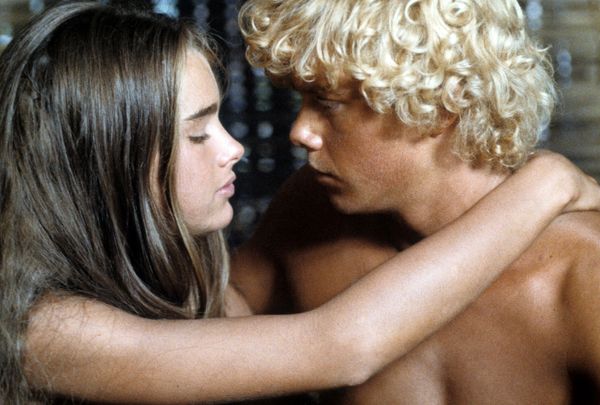 Brooke Shields and Christopher Atkins in "The Blue Lagoon," 1980 (Columbia Pictures/Getty Images)The scene: Years after a shipwreck leaves young cousins marooned on a tropical island, a teenage Emmeline (Brooke Shields) wades in the waters of an idyllic waterfall, her long hair gracefully tumbling down her torso. It's a vision of paradise . . . until she looks down at her bloody hands and screams in terror. "Go away, don't look at me!" she cries to Richard (Christopher Atkins), who is brimming with naive concern. "Em, people don't bleed like that unless they've cut themselves." Emmeline is mortified, Richard is clueless, and if that doesn't sum up both puberty and your first preteen relationship, I don't know what does.
Brooke Shields and Christopher Atkins in "The Blue Lagoon," 1980 (Columbia Pictures/Getty Images)The scene: Years after a shipwreck leaves young cousins marooned on a tropical island, a teenage Emmeline (Brooke Shields) wades in the waters of an idyllic waterfall, her long hair gracefully tumbling down her torso. It's a vision of paradise . . . until she looks down at her bloody hands and screams in terror. "Go away, don't look at me!" she cries to Richard (Christopher Atkins), who is brimming with naive concern. "Em, people don't bleed like that unless they've cut themselves." Emmeline is mortified, Richard is clueless, and if that doesn't sum up both puberty and your first preteen relationship, I don't know what does.
Verdict: Cut off from human civilization, menstruation seems a freak phenomenon to Emmeline and Richard. The fumbling conversation is the only nod the film makes to Emmeline's period, and next thing we know, she's pregnant. From male director and writer duo Randal Kleisler and Douglas Day Stewart, "The Blue Lagoon" is not the film to watch to gain a realistic grasp of a menstrual cycle and its significance.
"The Cosby Show" (Season 7, Episode 9 – 1980)
The scene: In "The Infantry has Landed (And They've Fallen Off the Roof)," the adorably matter-of-fact Rudy (Keshia Knight Pulliam) gets her period. And in contrast to the horrific embarrassment portrayed in "Carrie" or "Blue Lagoon," Rudy's period is treated as a glorious passage through the gates of womanhood. "Just think Rudy, you're the first one in our group to get it," her friends whisper conspiratorially in Rudy's bedroom. "You even look a little more mature." "Well, I did feel a little older walking home from school today," Rudy responds, tilting her chin upward with an air of pretension. "Don't worry, you'll get yours soon."
Verdict: "The Cosby Show" acknowledges the existential anxiety one experiences before their first cycle ("My sister's friend knew somebody and when she got her period she was so weak, she had to be carried around in a stretcher for three months," Rudy's friend warns) while comically poking at its absurdity. For Rudy, her period is a bragging right, something she can use to inform her less-experienced gang of thirteen year old friends. The episode offers a refreshing, confident response to menstruation.
"My Girl" (1991)
The scene: Eleven-year-old Vada Sultenfuss (Anna Chlumsky) is on the cusp of a summer of firsts — first crush, first kiss, and yes, first period. "Oh my god!" she screeches upon discovering she's bleeding. "I'm hemorrhaging." A young Jamie Lee Curtis gives a solemn talk about sex and periods to a comically incredulous Vada. "It's not fair; nothing happens to boys," she says, casting a disgruntled look toward the ground. When her best friend Thomas (played by a mini Macaulay Culkin), comes knocking with an ill-fated request for play-time, she shoves him to the ground. "Don't come back for five to seven days!" she exclaims, slamming the door.
Verdict: From writer Laurice Elehwany, the film's depiction of menstruation is endearing if unhelpful. It falls into the common period trope of the embarrassed young girl's sudden bodily shame accompanied by her clueless male counterpart.
"Degrassi" (Season 1, Episode 9 – 2002)
The scene: In "Coming of Age," Emma (Miriam McDonald) gets her first period while she's wearing a white skirt. Oops! As a Hail Mary, she swaps out borrowed too-large gym shorts that keep slipping down. As the preternaturally confident Emma marches to the front of the class – with best friend Paige (Lauren Collins) holding up the shorts for her – she delivers a book report to an audience of jeering preteen boys. "Ahhh did Emmy pee her pants?" they leer. "No, I just got my period for the first time," Emma replies with a cutting sweetness. "Menstruation, you may have heard of it. Happens to, oh, 50% of the population. Perfectly natural, nothing to be ashamed of." Mic drop.
Verdict: If only I had the confidence at 13 to own my period in shorts dangerously close to ending up in a pool around my ankles to a class full of callous boys! That's why these sorts of depictions are so important. The period-confident script owes its brilliance to a team of two females and one male writer: Linda Schuyler, Yan Moore and Susin Nielsen.
Want a daily wrap-up of all the news and commentary Salon has to offer? Subscribe to our morning newsletter, Crash Course.
"Game of Thrones" (Season 2, Episode 7 – 2012)
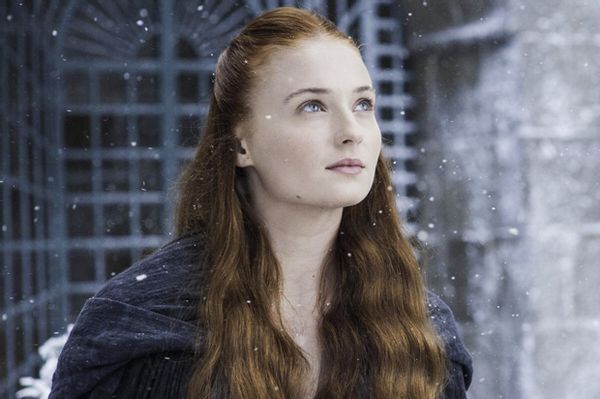 Sophie Turner as Sansa Stark in "Game of Thrones" (HBO)The scene: In "A Man Without Honor," Sansa's period comes as something of a nightmare – literally. After a dream in which she is dragged by her feet and stabbed by a mob of angry men, Sansa (Sophie Turner) awakens in a pool of her own period blood and begins frantically slashing at her stained sheets with a knife. "Flowering," as it is called in Winterfell, means that Sansa, now able to get pregnant, might be forced to wed sadistic bully Prince Joffrey. "I thought it would be less messy," Sansa admits to Queen Cersei (Lena Headey). "You're a woman now," Cersei replies. "Do you have any idea what that means?"
Sophie Turner as Sansa Stark in "Game of Thrones" (HBO)The scene: In "A Man Without Honor," Sansa's period comes as something of a nightmare – literally. After a dream in which she is dragged by her feet and stabbed by a mob of angry men, Sansa (Sophie Turner) awakens in a pool of her own period blood and begins frantically slashing at her stained sheets with a knife. "Flowering," as it is called in Winterfell, means that Sansa, now able to get pregnant, might be forced to wed sadistic bully Prince Joffrey. "I thought it would be less messy," Sansa admits to Queen Cersei (Lena Headey). "You're a woman now," Cersei replies. "Do you have any idea what that means?"
Verdict: Sansa's period is a horrific experience – a medieval rite of passage forcing her to marry and bear children without her consent. One can only hope their period experience is a step up from Sansa's. While we may think of this as an archaic point of view, it isn't in some societies. For a show that dealt in power plays and imbalances, this is the first of many for the women of Westeros and beyond.
"Big Mouth" (Season 1, Episode 2 – 2017)
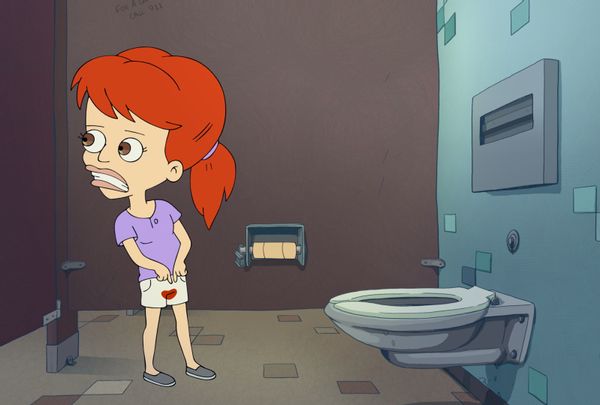 Jessi gets her period in "Big Mouth" (Netflix)The scene: In "Everybody Bleeds," Jessi (voiced by Jessi Glaser) gets her first period while visiting the Statue of Liberty. As she bends and peers between her legs to witness the bright red blotch expanding on her white shorts, she says what just about anyone would in that situation: "I just got my first period in the f**king Statue of Liberty!" A series of unfortunate events befalls her next: empty toilet paper rolls in the public restroom and a disgusted Andrew (voiced by John Mulaney) vomiting in response to her confession. Eventually he helps her out and buys her a commemorative 9/11 towel for her to wear in lieu of her soiled shorts. Bonus young period content: Three seasons later, Jessi is still navigating her period as she learns to use tampons at camp.
Jessi gets her period in "Big Mouth" (Netflix)The scene: In "Everybody Bleeds," Jessi (voiced by Jessi Glaser) gets her first period while visiting the Statue of Liberty. As she bends and peers between her legs to witness the bright red blotch expanding on her white shorts, she says what just about anyone would in that situation: "I just got my first period in the f**king Statue of Liberty!" A series of unfortunate events befalls her next: empty toilet paper rolls in the public restroom and a disgusted Andrew (voiced by John Mulaney) vomiting in response to her confession. Eventually he helps her out and buys her a commemorative 9/11 towel for her to wear in lieu of her soiled shorts. Bonus young period content: Three seasons later, Jessi is still navigating her period as she learns to use tampons at camp.
Verdict: "Big Mouth" sums up the righteous indignation one feels upon discovering, as Jessi eloquently phrased it, "blood is coming out of my vagina!" And as we've seen time and again, the lack of plentiful period products puts menstruating folks in a position of embarrassment and possibly relying on others. Writer Kelly Galuska earns an A+.
RELATED: How period humor is changing the world
"Black-ish" (Season 4, Episode 6 – 2017)
The scene: In "First and Last," a brave Diane (Marsai Martin) is the first person in her class to get her period and is forced to change into sweatpants sourced from the lost and found. In flashback, we see how her family's matriarchs navigate the period talk with their daughters. First, Ruby Johnson (Jenifer Lewis) gives Rainbow (Tracee Ellis Ross) the "talk" in full shaman garb, blowing a horn and proclaiming, "May the sacred flow of your menses topple the patriarchy and bind you to the goddess!" Years later, Rainbow's talk with Zoey (Yara Shahidi) is a bit more, well, clinical. "This is a beautiful thing honey," she says, pointing to an anatomical screen display. "Your uterine lining is decaying and then sloughing off and then turning into blood as it moves out of your vaginal canal." Zoey looks on in horror.
Verdict: Written by Laura Gutin Petrson and directed by Linda Mendoza, this episode of "Black-ish" reflects the challenges of mother-daughter dialogue during a formative period and conveys the ways in which generational understanding of gender roles and femininity inform these conversations.
"Baby-Sitter's Club" (Season 1, Episode 8 – 2020)
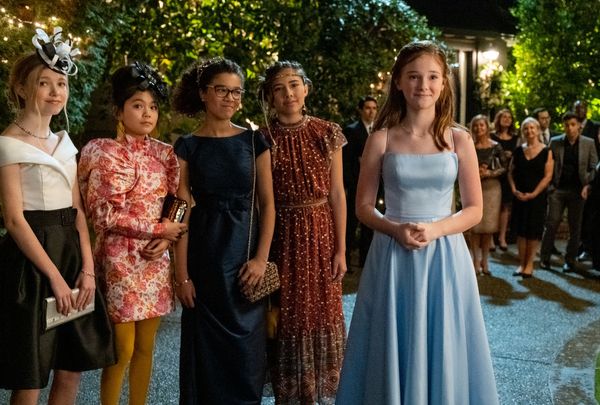 Shay Rudolph, Pomona Tamada, Malia Baker, Xochitl Gomez and Sophie Grace in "The Baby-sitters Club" (Liane Hentscher/Netflix)The scene: On "Kristy's Big Day," Kristy (Sophie Grace) receives the full support of her friend group as she faces her first period at a rather inopportune moment – her mother's wedding, already riddled with tension as Kristy negotiates her role in her mother's changing personal life. As Kristy rushes to the bathroom, lifting her light blue dress in frustration, her friends crowd outside. "It's natural," they whisper, passing her a pad through the cracked door. "We're your friends, and this is a big moment."
Shay Rudolph, Pomona Tamada, Malia Baker, Xochitl Gomez and Sophie Grace in "The Baby-sitters Club" (Liane Hentscher/Netflix)The scene: On "Kristy's Big Day," Kristy (Sophie Grace) receives the full support of her friend group as she faces her first period at a rather inopportune moment – her mother's wedding, already riddled with tension as Kristy negotiates her role in her mother's changing personal life. As Kristy rushes to the bathroom, lifting her light blue dress in frustration, her friends crowd outside. "It's natural," they whisper, passing her a pad through the cracked door. "We're your friends, and this is a big moment."
Verdict: The series portrays companionship in what could have devolved into a moment of isolation and confusion for Kristy. The woman-produced and directed series infuses warmth and a sense of belonging, not alienation and isolation, into its depiction of menstruation.
"PEN15" (Season 2, Episode 5 – 2020)
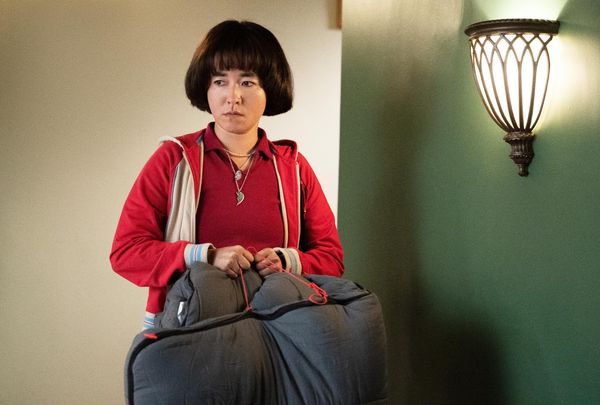 Maya Erskine in the "Sleepover" episode of "PEN15" (Erin Simkin/Hulu)The scene: In the sleepover from hell Maya (Maya Erskine), wearing a scarlet hoodie of course, gets her period and stuffs toilet paper in her underwear to trap her flow of blood. Not willing to tell her friends what's going on, throughout the night she sneaks off to her host's bathroom to refortify her toilet paper shield. The anxiety of getting caught is reflected in a sinister scene in which the group of girls lock Maya in the bathroom and force her to play Bloody Mary as lights flicker on and off and streams of blood seep out of a creepy mask on the bathroom wall. When Maura (Ashlee Grubbs) pulls Maya's pants down in a sadistic form of preteen punishment, the secret is officially out. The girls toss around the makeshift pad screaming bloody murder. "Ew! Is that what you use for a pad?" Maya appears on the verge of tears. "Okay you guys are being really mean," she says with a heartbreaking pang of embarrassment. "It's my blood."
Maya Erskine in the "Sleepover" episode of "PEN15" (Erin Simkin/Hulu)The scene: In the sleepover from hell Maya (Maya Erskine), wearing a scarlet hoodie of course, gets her period and stuffs toilet paper in her underwear to trap her flow of blood. Not willing to tell her friends what's going on, throughout the night she sneaks off to her host's bathroom to refortify her toilet paper shield. The anxiety of getting caught is reflected in a sinister scene in which the group of girls lock Maya in the bathroom and force her to play Bloody Mary as lights flicker on and off and streams of blood seep out of a creepy mask on the bathroom wall. When Maura (Ashlee Grubbs) pulls Maya's pants down in a sadistic form of preteen punishment, the secret is officially out. The girls toss around the makeshift pad screaming bloody murder. "Ew! Is that what you use for a pad?" Maya appears on the verge of tears. "Okay you guys are being really mean," she says with a heartbreaking pang of embarrassment. "It's my blood."
Verdict: Series co-creators Maya Erskine and Anna Konkle do a wonderful job encapsulating the disorienting embarrassment of adolescence and the strain it puts on even the most innocuous of childhood get-togethers. Their depiction of menstruation intentionally verges on the absurd — I can only hope no one is getting pantsed while on their first period – to play on our greatest teenage fears of humiliation, especially regarding menstruation.
"The Queen's Gambit" (Season 1, Episode 2 – 2020)
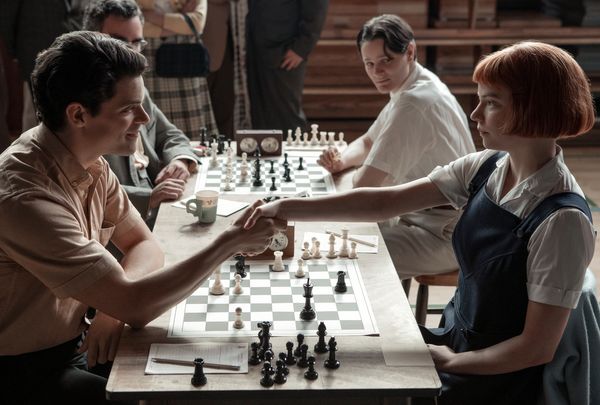 Jacob Fortune-Lloyd and Anya Taylor-Joy in "The Queen's Gambit" (Phil Bray/Netflix)The scene: A pensive Beth (Anya Taylor-Joy) feels a stabbing pain in her abdomen while competing at a chess tournament. As she runs to the bathroom, she discovers a stream of blood flowing down her leg. An empathetic teenager in the bathroom gives her a tampon — a foreign contraption to Beth, who sticks with the classic faux toilet paper pad. Beth is visibly uncomfortable speaking about the ordeal afterwards. "I just thought . . ." she trails off, "Thought I was sick." She makes a swift exit from the bathroom.
Jacob Fortune-Lloyd and Anya Taylor-Joy in "The Queen's Gambit" (Phil Bray/Netflix)The scene: A pensive Beth (Anya Taylor-Joy) feels a stabbing pain in her abdomen while competing at a chess tournament. As she runs to the bathroom, she discovers a stream of blood flowing down her leg. An empathetic teenager in the bathroom gives her a tampon — a foreign contraption to Beth, who sticks with the classic faux toilet paper pad. Beth is visibly uncomfortable speaking about the ordeal afterwards. "I just thought . . ." she trails off, "Thought I was sick." She makes a swift exit from the bathroom.
Verdict: The limited series created and written by a man mystically connects Beth's period to other coming-of-age firsts like her first tournament win and first crush. It's both a little too neat and convenient while simultaneously confirming periods to be a taboo source of shame, spoken in hushed tones even in the bathroom. It's hard not to grow tired of the narrative; though set from 1958-1968, perhaps the attitude is more of its time.
"Creamerie" (Season 1, Episode 4 – 2021)
The scene: In this dark and delightful Kiwi comedy set in a future where men have died off from a virus, friends Alex, Jaime and Pip (Ally Xue, J.J. Fong and Perlina Lau) attend Syncfest – an annual celebration of menstruation – that includes the Menstrual Cycle ferris wheel, Mooney the menstrual cup mascot, and best of all, a Menarche Tent where a young person's "first bleed" is congratulated and feted with a gift bag, including a complimentary hot water bottle. Score!
Verdict: This is the sort of celebration and everyday, transparent treatment that menstruation should have in our real world, instead of teaching young folk that their bodies are scary, foreign or shameful. Imagine what such an open dialogue would do for everyone, such as banishing misconceptions about periods emanating from the butt. Plus: free tote bag!
"Turning Red" (2022)
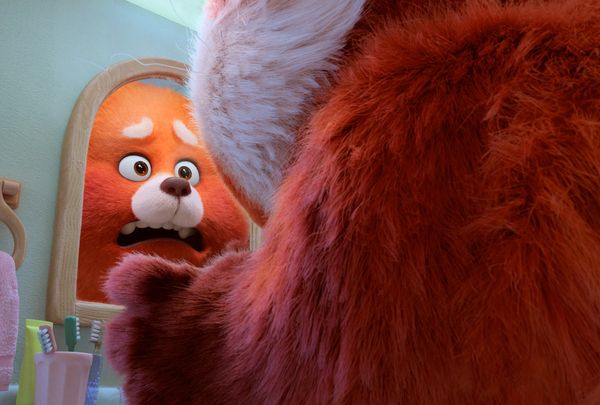 Mei confronts her new image in "Turning Red" (Disney/Pixar)The scene: Thirteen-year-old Meilin Lee (voiced by Rosalie Chiang) walks in the bathroom one morning and shrieks in terror. "Did the red peony bloom?" her mother asks, armed with a slew of pads and a hot water bottle outside the door, prepared for her daughter's first period. However, Mei's problem is that she's turned into a giant red panda. "I'm a gross red monster! Don't look at me!" she yells. Throughout the film we see Mei navigate her new normal, hulking out into a red panda each time her emotions run high and trying to understand the parameters of her new body. Yep, that's puberty and the messiness that comes with it — hormones, periods, body hair and the general experience of one's body changing beyond one's control. Yet Mei learns to play her red panda's vulnerability as a strength. "We've all got a messy, loud, weird part of ourselves hidden away," she muses at the end of the film.
Mei confronts her new image in "Turning Red" (Disney/Pixar)The scene: Thirteen-year-old Meilin Lee (voiced by Rosalie Chiang) walks in the bathroom one morning and shrieks in terror. "Did the red peony bloom?" her mother asks, armed with a slew of pads and a hot water bottle outside the door, prepared for her daughter's first period. However, Mei's problem is that she's turned into a giant red panda. "I'm a gross red monster! Don't look at me!" she yells. Throughout the film we see Mei navigate her new normal, hulking out into a red panda each time her emotions run high and trying to understand the parameters of her new body. Yep, that's puberty and the messiness that comes with it — hormones, periods, body hair and the general experience of one's body changing beyond one's control. Yet Mei learns to play her red panda's vulnerability as a strength. "We've all got a messy, loud, weird part of ourselves hidden away," she muses at the end of the film.
Verdict: Directed by Domee Shi, the first woman filmmaker with sole directing credit on a Pixar feature, "Turning Red" offers an imaginative glimpse into a complex dynamic between a mother and daughter as Mei Lee navigates the myriad of emotions that come with panda puberty. The film is also unabashedly embraces the weird ways that young desire manifests into fandom worship, crushes and really bizarre (but amazing) fan fiction and art.
More stories to read:
- Period pride takes pop culture by storm
- We were American girls: What Addy taught me about Black hair, freedom and myself
- Instagram has a problem with women: Bloody accident photos are fine but periods are "inappropriate"?
- Bo Burnham refused to edit R-rated "Eighth Grade" into PG-13 and advises teenagers to "sneak in"


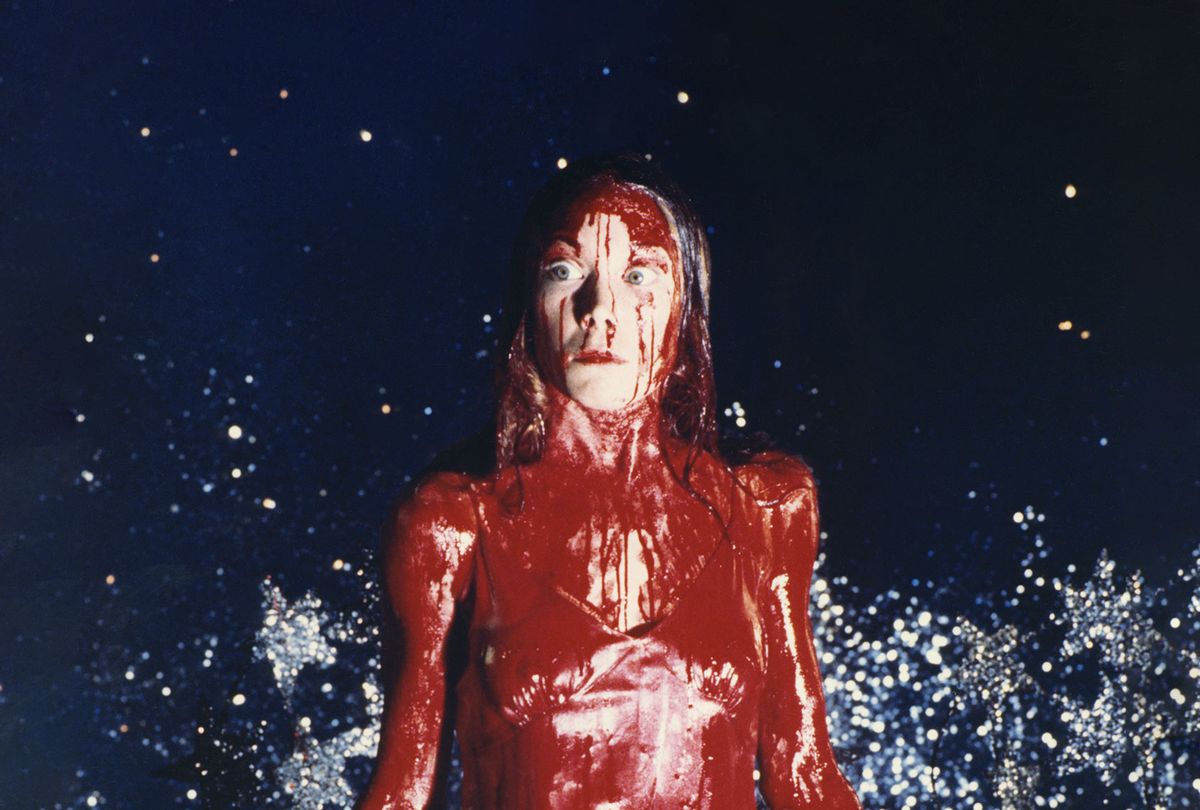
Shares